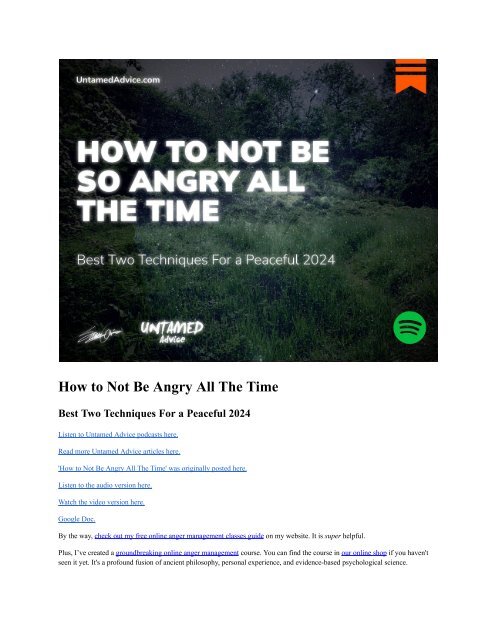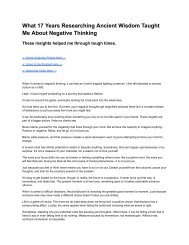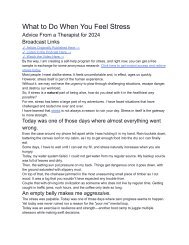How to Not Be So Angry All the Time: Best Two Techniques For a Peaceful 2024
In this video essay, “How to Not Be So Angry All the Time”, I talk about two key anger management techniques in psychology; ‘metacognition’ and ‘cognitive reappraisal.’ Both techniques were incredibly helpful in managing anger during life-threatening situations in the wilderness. Often, it’s hard to find anger management techniques that work. Particularly in a stressful world. All ages, from elders, parents, children and teens, find anger management is difficult situation. Anger management techniques for kids can be useful if you notice your child is struggling, as well as applying these techniques for yourself while parenting. My name’s Jamie; I’m a psychologist living in the beautiful English wilderness. I work as a certified counsellor, wellness coach, and writer, providing mental health content for anyone who needs it. In my counselling and coaching practice, I work with people over the age of 18. However, the free content I put out is applicable to all ages and anyone from any background. I’ve personally had a lot of experience with anger management. I know what it is like, and I know how hard it can get. Please remember that you are not alone. Many of us suffer from aggression issues. Please give this video a thumbs up if you found it helpful, as that helps me reach more people. Always feel free to comment, as discussion allows us all to explore different angles, which is helpful for managing rage. Useful links: ✓ Groundbreaking Online Anger Management Course → https://untamedadvice.com/store/ancient-anger-management-cpd-certified-online-anger-management-course/ ✓ Anger Management Resources Page → https://untamedadvice.com/free/anger-management/ ✓ Helpful Free Online Anger Management Classes → https://untamedadvice.com/free/free-online-anger-management-classes/ ✓ Useful Anger Management Advice → https://untamedadvice.com/blog/anger-management-advice/ ✓ Free Simply Self-Help Samples → https://untamedadvice.com/store/simply-self-help-free-sample/ ✓ Read the Original Article & Get Subscriber benefits → https://untamedadvice.substack.com/p/how-to-not-be-angry-all-the-time ✓ Listen & Subscribe to the Podcast → https://rss.com/podcasts/untamedadvice/1327522/
In this video essay, “How to Not Be So Angry All the Time”, I talk about two key anger management techniques in psychology; ‘metacognition’ and ‘cognitive reappraisal.’ Both techniques were incredibly helpful in managing anger during life-threatening situations in the wilderness.
Often, it’s hard to find anger management techniques that work. Particularly in a stressful world. All ages, from elders, parents, children and teens, find anger management is difficult situation. Anger management techniques for kids can be useful if you notice your child is struggling, as well as applying these techniques for yourself while parenting.
My name’s Jamie; I’m a psychologist living in the beautiful English wilderness. I work as a certified counsellor, wellness coach, and writer, providing mental health content for anyone who needs it. In my counselling and coaching practice, I work with people over the age of 18. However, the free content I put out is applicable to all ages and anyone from any background. I’ve personally had a lot of experience with anger management. I know what it is like, and I know how hard it can get.
Please remember that you are not alone. Many of us suffer from aggression issues.
Please give this video a thumbs up if you found it helpful, as that helps me reach more people. Always feel free to comment, as discussion allows us all to explore different angles, which is helpful for managing rage.
Useful links:
✓ Groundbreaking Online Anger Management Course → https://untamedadvice.com/store/ancient-anger-management-cpd-certified-online-anger-management-course/
✓ Anger Management Resources Page → https://untamedadvice.com/free/anger-management/
✓ Helpful Free Online Anger Management Classes → https://untamedadvice.com/free/free-online-anger-management-classes/
✓ Useful Anger Management Advice → https://untamedadvice.com/blog/anger-management-advice/
✓ Free Simply Self-Help Samples → https://untamedadvice.com/store/simply-self-help-free-sample/
✓ Read the Original Article & Get Subscriber benefits → https://untamedadvice.substack.com/p/how-to-not-be-angry-all-the-time
✓ Listen & Subscribe to the Podcast → https://rss.com/podcasts/untamedadvice/1327522/
- No tags were found...
Create successful ePaper yourself
Turn your PDF publications into a flip-book with our unique Google optimized e-Paper software.
<strong>How</strong> <strong>to</strong> <strong>Not</strong> <strong>Be</strong> <strong>Angry</strong> <strong>All</strong> The <strong>Time</strong><br />
<strong>Be</strong>st <strong>Two</strong> <strong>Techniques</strong> <strong>For</strong> a <strong>Peaceful</strong> <strong>2024</strong><br />
Listen <strong>to</strong> Untamed Advice podcasts here.<br />
Read more Untamed Advice articles here.<br />
'<strong>How</strong> <strong>to</strong> <strong>Not</strong> <strong>Be</strong> <strong>Angry</strong> <strong>All</strong> The <strong>Time</strong>' was originally posted here.<br />
Listen <strong>to</strong> <strong>the</strong> audio version here.<br />
Watch <strong>the</strong> video version here.<br />
Google Doc.<br />
By <strong>the</strong> way, check out my free online anger management classes guide on my website. It is super helpful.<br />
Plus, I’ve created a groundbreaking online anger management course. You can find <strong>the</strong> course in our online shop if you haven't<br />
seen it yet. It's a profound fusion of ancient philosophy, personal experience, and evidence-based psychological science.
Also, if you can't afford <strong>the</strong>rapy, I am making something significantly more affordable. It's a self-help resource. As of writing<br />
this newsletter, I'm giving out free self-help samples for stress on my website. Make sure you look at that as well. I'll also create<br />
more content around anger management within that resource, so it pays <strong>to</strong> get <strong>the</strong> free samples while <strong>the</strong>y're still available.<br />
Finally, I've written a blog post with helpful anger management advice <strong>to</strong> get you started. Please make sure you get that on my<br />
blog.<br />
When Rage Strikes<br />
Anger. It's an emotion I know all <strong>to</strong>o well. It has hit me hard in <strong>the</strong> past, and my subsequent actions were not so great.<br />
When we get emotional, we can easily make mistakes. I know I have. Anger has led <strong>to</strong> a lot of mistakes in my past.<br />
You are always more powerful when you're calm.<br />
Anger is natural. It's crucial <strong>to</strong> remember that anger is an emotional response <strong>to</strong> danger, injustice, or an obstacle within our path;<br />
it is not a reason <strong>to</strong> mistreat yourself or give up.<br />
My Relationship <strong>to</strong> Rage<br />
My relationship with rage is as long as I can remember. It is a profound relief not <strong>to</strong> repress or overindulge in anger anymore.
I experience frustration now, like <strong>the</strong> doorway <strong>to</strong> problem-solving. Anger now drives me <strong>to</strong> understand and transform challenges<br />
in<strong>to</strong> productive output.<br />
When I crash-landed in <strong>the</strong> wilderness, everything was physically gruelling. The winter is <strong>the</strong> most challenging.<br />
One example of this was carrying water over uneven ground. I often found myself racing against <strong>the</strong> setting sun while heavy rain<br />
saturated <strong>the</strong> floor beneath me. As uneven as <strong>the</strong> ground was, <strong>the</strong> extra liquid made slipping and losing <strong>the</strong> water highly likely.<br />
Pure, seething wrath would explode each time it happened, like a volcano erupting aggressively each time I lost water.<br />
Despite <strong>the</strong> wilderness hardships, my problems changed. In <strong>the</strong> city, my triggers revolved around people, work, and social<br />
groups. It was all about survival here; I wouldn't change that for <strong>the</strong> world.<br />
Rage Responsibility<br />
What I see now is anger is <strong>the</strong> ability <strong>to</strong> respond. People often misunderstand <strong>the</strong> 'ability <strong>to</strong> respond', also known as<br />
responsibility.<br />
Many see it as a ball and chain hanging around our necks. My perspective is a stark contrast now.<br />
Wilderness survival has taught me that responsibility is a superpower.<br />
When we take responsibility for ourselves, we act better than we should or would have previously.<br />
Responsibility with discipline is essential for resourcefulness. Survival is hard if you're not resourceful.<br />
You can transform seemingly desperate situations in<strong>to</strong> practical action. Responsibility is far more helpful than a lot of people<br />
wish <strong>to</strong> admit. I can understand because I may have seen life <strong>the</strong> same way as a teenager.
Feel The Burn, Stay <strong>Peaceful</strong> Anyway<br />
When it comes <strong>to</strong> anger, rage hurts when it starts <strong>to</strong> catch fire. <strong>For</strong> me, it pours through my body like hot lava, and as I fume, it<br />
can take painful turns.<br />
In <strong>the</strong> past, I found myself smashing stuff from lampshades <strong>to</strong> beautiful ornamental urns.<br />
Now I still feel all <strong>the</strong> emotions, only I'm not breaking my furniture. Peace is <strong>the</strong> release of angry moments now. <strong>Not</strong> <strong>the</strong><br />
destruction of your drywall.<br />
Looking back in compassion, it's evident that each outburst was a lesson. It's never apparent when you're amid rage.<br />
Hindsight is an annoying yet illuminating experience.<br />
What The Wilderness Taught Me About Rage<br />
Rolling around and screaming isn't a helpful solution when your life depends on your performance.<br />
Instead, it's crucial first <strong>to</strong> pause and take a step back. <strong>All</strong>ow your thoughts and emotions <strong>to</strong> rest.<br />
The ancients call this process 'resting in awareness.'
Practically, that means that you s<strong>to</strong>p focusing on your thoughts and emotions for a brief moment. Then you relax your attention.<br />
In doing so, your awareness opens up, and you become aware of being aware.<br />
It pivots your focus from a painful identity (being at <strong>the</strong> whim of <strong>the</strong> situation and <strong>the</strong> unfairness of what you may be going<br />
through) <strong>to</strong> being present in <strong>the</strong> moment. The problem doesn't constrain this presence, giving you space from being engulfed by<br />
frustration.<br />
This pivot is <strong>the</strong> first step <strong>to</strong> mental freedom. Mental freedom starts in <strong>the</strong> mind by being free from what you feel while you feel<br />
it. In counselling and psychological science, we call this process meta-cognition.<br />
I love helping clients achieve this process of freedom during untamed advice sessions. It's humbling <strong>to</strong> see people transform<br />
through realising <strong>the</strong>y can be free, even when <strong>the</strong>y don't feel okay.<br />
Meta-cognition, resting as awareness, or instinctive recognition—however you want <strong>to</strong> call it, is a massive step <strong>to</strong>wards personal<br />
responsibility. You take responsibility by choosing who you are at that moment.<br />
You respond <strong>to</strong> uncomfortable emotions but don't react. This first step was so helpful when it seemed everything around me<br />
wasn't working, and danger was painfully present.<br />
Taking responsibility within you gives you <strong>the</strong> power <strong>to</strong> act and direct yourself most favourably.<br />
Challenging Trauma <strong>For</strong> <strong>Be</strong>tter Anger Outcomes<br />
Once you have that initial space <strong>to</strong> brea<strong>the</strong>, <strong>the</strong> next step is <strong>to</strong> challenge your perspective on <strong>the</strong> situation.<br />
What I saw in myself is that I would overlay past trauma on <strong>the</strong> present moment. My life has been a rich tapestry of wild<br />
adventure. Adventure puts you in all kinds of situations. <strong>So</strong>me are incredible, while o<strong>the</strong>rs can be traumatic.<br />
When we overlay past trauma, it's as if we have tinted glasses, colouring our experience and exaggerating <strong>the</strong> situation.<br />
Cognitive reappraisal is a valuable technique in anger management <strong>to</strong> challenge our assumptions around a situation and work<br />
<strong>to</strong>wards a better evaluation.<br />
Once you have that initial momentary freedom from what you feel, you can <strong>the</strong>n look at <strong>the</strong> situation without trauma bias.<br />
<strong>For</strong> me, my past would be screaming and cursing. While that happened, I would seek <strong>to</strong> look at more than one angle.<br />
This expanded view gave me better insight in<strong>to</strong> how <strong>to</strong> manoeuvre through <strong>the</strong> circumstances.<br />
The outcome was far better. I found that challenging my description of <strong>the</strong> moment helpful. A few questions I asked myself were:
●<br />
●<br />
●<br />
●<br />
●<br />
●<br />
●<br />
●<br />
●<br />
●<br />
Is my reaction equal <strong>to</strong> <strong>the</strong> circumstance?<br />
Am I exaggerating anything here?<br />
Is this something that usually triggers me?<br />
Is <strong>the</strong>re a solution that helps?<br />
Is <strong>the</strong>re something I can let go of?<br />
If I didn't take this personally, would it be that bad?<br />
Is <strong>the</strong>re ano<strong>the</strong>r explanation for what is happening?<br />
Is <strong>the</strong>re a better way <strong>to</strong> do things?<br />
Is this a sign of personal growth, and if so, how can I learn from this?<br />
<strong>How</strong> can I take responsibility for what is happening right now?<br />
Try it out yourself. First, pause, take a step back, and open your perspective. Relax your body and mind, and allow your<br />
sympa<strong>the</strong>tic nervous system <strong>to</strong> unwind.<br />
Then, ask yourself some clear-headed questions and see if you can move forward peacefully.<br />
Remember, It's your time <strong>to</strong> thrive. You can be free, you can be Untamed.<br />
Paid Subscriber <strong>Be</strong>nefits<br />
In this week's paid subscriber benefits, we'll explain how <strong>to</strong> use cognitive reappraisal for anger management.<br />
In case you don't yet know, 'cognitive reappraisal' is a psychological technique that involves changing <strong>the</strong> way you think about a<br />
situation <strong>to</strong> alter your emotional response.<br />
This post lets you become a paid subscriber and support Untamed Advice <strong>to</strong> keep broadcasting.









